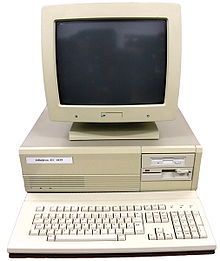The Changing PC Gaming Landscape
 Over the last five years, there has been a question among many PC gamers on whether the PC gaming platform is dying because of the popularity of consoles. I have asked myself this question several times, did some research, and concluded that PC gaming is not dying, but is only changing due to most game developer’s decisions to develop and market the games on consoles first and then later port it over to the PC.
Over the last five years, there has been a question among many PC gamers on whether the PC gaming platform is dying because of the popularity of consoles. I have asked myself this question several times, did some research, and concluded that PC gaming is not dying, but is only changing due to most game developer’s decisions to develop and market the games on consoles first and then later port it over to the PC.
Some PC gamers have stated that the game Crysis, released by Electronic Arts on the PC in 2007, was to blame for the downfall of PC game exclusives. The high-recommended system requirements of the game made many gamer PCs choke when maxing out the graphics. Even the medium settings were an issue for PCs that had bleeding edge hardware installed. Game developer Crytek had later stated that the game engine code was to blame for the sluggishness, and released a few patches to fix it. To this day, the game is still a resource hog and struggles to run smoothly at max settings on high end PCs.
Poor sales of Crysis led game director, Cevat Yerli, to issue a statement that piracy was to blame for the low sales numbers, when in fact it was game reviews and word of mouth that led to the low numbers. Many PC gamers that wanted to purchase the game found out early that this game was a dog and shied away from it. At the time, the average PC gamer probably had a system with a single core processor and probably an NVIDIA GeForce 8 or 7 series video card, and it just wasn’t capable of getting smooth frame rates unless you turned the in-game details to low, which resulted in a poor gaming experience.
The so-called death of PC gaming can possibly be attributed to the release of the game Deus Ex: Invisible War, which was released in December of 2003. This game had been developed on the original Microsoft Xbox and then ported to the PC. Due to the Xbox’s low memory, the console port was to blame for the small levels and low-resolution graphics. In a video posted on YouTube, the game’s lead designer, Warren Smith, blamed the use of the Unreal 2 engine for poor performance and the Xbox’s memory limitations for the small levels. Hardcore Deus Ex fans had criticized the changing of weapon ammo from being separate to the same for every weapon. They also weren’t too happy with the weaker interface and overall easier game play. If you were a PC gamer back in 2003, you could see some early warning signs of what was coming if you had played this game.
Since the release of Deus Ex: Invisible War, games released on the PC from console ports have been a mix between fair, bad and terrible. There can be a myriad of problems with these games ranging from poor keyboard controls to low FOV (field of view), making the game unplayable for many. Other problem areas are weak AI, bugs and much simpler game play. While game developers have done a lot to improve their game ports to the PC, more work needs to be done to improve the overall experience. Aside from the technical issues, they need to focus on creating more complex and engaging games if they want to keep PC gamers happy.

